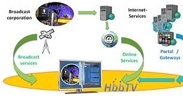European public broadcasters take to HbbTV

Momentum behind the HbbTV hybrid standard designed to unify broadcast and broadband services behind a common user interface is gathering pace in Europe outside the UK with trials or deployments by several major public broadcasters. Even in the UK, HbbTV is gaining some ground, having been adopted there by the Digital TV Group (DTG), responsible for digital terrestrial broadcasting, in the 7th edition of its D-Book. This defines the interoperability specification for UK digital terrestrial television, and by endorsing HbbTV, the DTG has created some confusion since the country appeared to be adopting an alternative platform, YouView. This is a consortium backed by the BBC, ITV, Channel Four, Channel Five, BT, TalkTalk and Arqiva, aiming to launch its proposed hybrid broadcast and broadband platform in February 2012. As provider of the UK’s terrestrial infrastructure, Arqiva now appears to have a foot in both the YouView and HbbTV camps, so the future course of UK hybrid DTT services is unclear.
Outside the UK, though, Europe is rallying behind HbbTV, with NPO (the Dutch public broadcasting organization) conducting HbbTV trials on the Canal Digital satellite DTH platform and on the Ziggo cable networks, according to Dutch magazine Totaal TV. The Canal Digital trials are kicking off with Sony Bravia connected TV sets that have built-in satellite tuners as well as HbbTV support. Other leading CE manufacturers, including Philips and Samsung, plan to pile into the burgeoning Dutch hybrid market with HbbTV enabled TVs by the end of the year. The services will include an HbbTV “red button” that will enable interactive services combining linear and Internet content to be unified within personalized EPGs.
At the same time, France Télévisions, the country’s state owned public broadcast network, has chosen HbbTV for a DTT portal providing access to international, national and regional news bulletins, along with sports reports and video weather forecasts as well as an electronic program guide. HbbTV will enable the broadcaster to combine Internet content, including non-video sources of information, with linear channels.
But, Spain has made arguably the strongest commitment with the commercial and public broadcasting sectors joining forces for joint HbbTV trials. Public broadcaster RTVE, Mediaset Spain (which owns commercial TV channels) and Telco giant Telefonica, all have entered into a three-way alliance to trial a HbbTV service. Mediaset España has been making video content available from its Internet TV portals such as Telecinco, while Telefónica has thrown its web TV service Terra TV into the mix. Broadcasters will include a Web page on screen to enable viewers to access the service by clicking on the link. Other broadcasters have been invited to join as the alliance heads toward full blown commercial launch in 2012 soon after YouView in the UK.
However, it is in Germany (regarded as the heartland for HbbTV, and where IRT, the technical institute of the German public broadcasters, has been strongly committed from the beginning) that real HbbTV services have been going longest. Two German public broadcasters, Bayerische Rundfunk in Bavaria and ZDF, have had hybrid TV services using HbbTV on digital terrestrial broadcasting across the Bavarian region since October 2010.
More recently, the ability of HbbTV both to provide access to foreign channels and extend the reach of existing services to new platforms was highlighted in Germany. Four Indian channels from Star TV were made available via HbbTV in May 2011 following a deal with TV distributor Mediapool.
At the same time, German sports channel Sport1 announced an agreement to make use of the HbbTV platform from interactive TV company Teveo for distribution of its signal to places where the channel is not carried by the local or regional operator.
The professional video industry's #1 source for news, trends and product and tech information. Sign up below.
HbbTV is also being adopted in some eastern European countries, with Czech Television testing HbbTV services by using set top boxes from ANTIK Technology, which is based in the Slovak republic. There is little doubt that HbbTV is sweeping the continent and even invading the UK, where, until now, YouView has steered a different course by arguing that service providers and operators should not be forced to take any single standards route for hybrid TV. It now looks like, in most of Europe at least, they will.v
